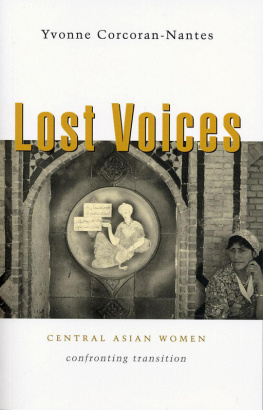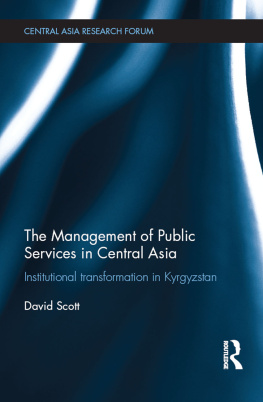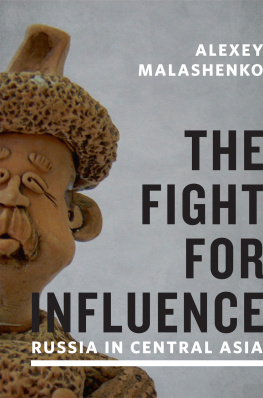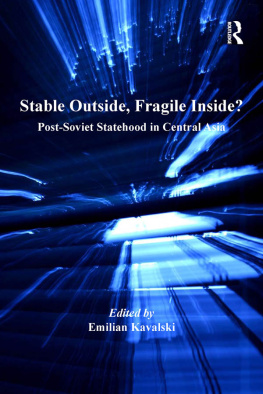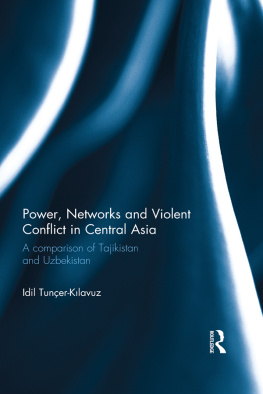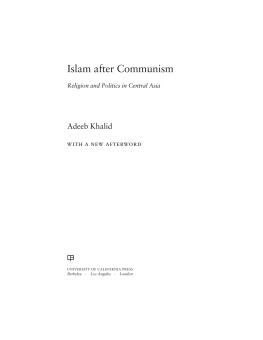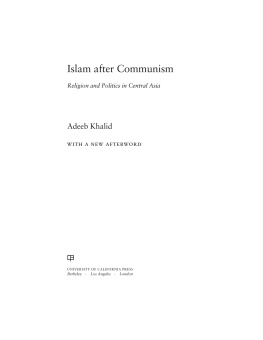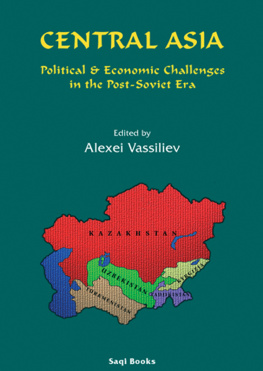About the author
Yvonne Corcoran-Nantes is a Senior Lecturer in the School of Political and International Studies and the Department of Womens Studies at Flinders University, South Australia. Her principal research interests and publications have been in the field of gender politics and development, and have focused on Latin America, Central Asia and Mongolia.
She has acted as a consultant to the UN and to international and national NGOs.
YVONNE CORCORAN-NANTES
Lost Voices
Central Asian women confronting transition
Zed Books
LONDON NEW YORK
Lost Voices: Central Asian women confronting transition was first published by Zed Books Ltd, 7 Cynthia Street, London N1 9JF, UK and Room 400, 175 Fifth Avenue, New York, NY 10010, USA in 2005.
This ebook edition was first published in 2013
www.zedbooks.co.uk
Copyright Yvonne Corcoran-Nantes, 2005
The right of Yvonne Corcoran-Nantes to be identified as the author of this work has been asserted by her in accordance with the Copyright, Designs and Patents Act, 1988.
Cover designed by Andrew Corbett
Set in Monotype Dante and Gill Sans Heavy by Ewan Smith, London
All rights reserved. No part of this publication may be reproduced, stored in a retrieval system or transmitted in any form or by any means, electronic, mechanical, photocopying or otherwise, without the prior permission of Zed Books Ltd.
A catalogue record for this book is available from the British Library.
US CIP data are available from the Library of Congress.
ISBN 978 1 84813 729 5
Contents
Acknowledgements
The process of researching and writing a book of this nature is rarely a solitary one. From the inception of this project I have been most fortunate in receiving consistent support, guidance and inspiration from many sources. First and foremost I would like to thank Lyndall Ryan and the late Bill Brugger for their unwavering academic and personal support in the early stages of this project. Their encouragement was fundamental to the initiation of the long journey to its completion. Special thanks also go to Susan Sheridan for reading though early drafts of chapters, for her enthusiasm and for lending a sympathetic ear when I felt overwhelmed by the enormity of the undertaking. With respect to my research in Central Asia, I am extremely grateful to the following people for their contributions and support: Zulfia, Dilshod, Janaa, Yvette, Erkhan, Lorraine, Julian, Charlotte, Richard and Meena. Particular thanks go to Mahbuba Ergasheva, who has offered invaluable information, unpublished works and consistent support, for which I am most especially grateful. A considerable debt of gratitude is owed to the Central Asian women and men whose words and thoughts are central to this text. Without their contribution and support this book could never have been completed.
On a personal note, I would like to thank my friend and colleague Suzanne Brugger, whose assistance, enthusiasm and unfailing comradeship throughout the entire project have been indispensable. Finally, I want to express my appreciation to Mario, Micaela and Liam for their love and emotional support, without which none of this would have been possible.
This book is dedicated to the memory of my father, James Corcoran, whose unfailing love and support will remain with me always.Introduction
We are very trapped. Were on a broken bridge between two different societies. We cant take pleasure in the new and we cant leave the old. I feel that some of the best parts of socialism we have lost. (Female journalist, Kyrgyzstan)
In 1991 the collapse of the Communist Party and the dissolution of the Soviet Union launched the republics of Uzbekistan, Kyrgyzstan and Kazakhstan into an unexpected, self-declared independence and a precarious, uncertain future. Emerging from almost seventy-five years of Soviet tutelage, all three republics embarked on a process of radical change which included the restructuring of the national economy, the implementation of a new constitution and a systematic renationalization of indigenous society through a process of wide-ranging political, economic and social reforms. Independence was not merely an act of the creation of new states but one of reclaiming Kyrgyz, Uzbek and Kazakh national identity. The political system, including leaders and political representatives, remained virtually the same except that in government offices pictures of Lenin were replaced by those of the national president. All public vestiges of Soviet influence were removed; street names were changed and statues of Soviet heroes were replaced by those of national poets and important historical figures. The names of the capital cities of Kazakhstan and Kyrgyzstan were changed from Alma-Ata to Almaty and from Frunze to Bishkek, while the location of the Kazakh capital was moved to Akmola in 1997. Yet for the majority of the Central Asian population, while the mask had changed the face remained the same.
The republics of Uzbekistan, Kazakhstan and Kyrgyzstan were part of what was once referred to as the Soviet Middle East which, along with Tajikistan and Turkmenistan, formed a buffer zone between the heartland of the Soviet Union, now Russia, and the Islamic republics of the Middle East. The sovietization of Central Asia in the early 1920s was an attempt to modernize Central Asian society, to eradicate local customs and mores and radically reduce or eliminate the influence of Islam among the indigenous population. Yet the ambivalence of Soviet policy towards Central Asian Muslims sustained rather than destroyed Islamic culture in the region. In fact what is most striking for visitors to the region is how unsuccessful anti-Islamic Soviet policy was. Islam, the foundation stone of Central Asian society, is the socio-political glue that has held the region together. While the republics of Central Asia remain secular states there is a higher percentage of Muslims in all three republics than of any other social group. Moreover, Islamic culture and law remained a major consideration when new socio-economic policies were being drawn up, and the implementation of policy invariably involved Muslim organizations and community groups in the distribution of humanitarian aid and special-needs programmes. These groups and organizations continued to exist in one form or another pre-independence, but in the post-independence period their importance and political weight have increased. This was reflected in the immediate programme of mosque rebuilding throughout Central Asia, most noticeable in Uzbekistan, where a growing number of young males and females attend religious schools (madrasahs). These schools of Islamic theology, once closed down by the Soviet state, now have long waiting lists for admission. Yet in spite of this the governments of all three republics maintain as ambivalent a policy towards Islam as that pursued in the past by the Soviet Union, on the one hand maintaining a modicum of spiritual recognition of a predominantly Islamic population while on the other implementing draconian policies to curb the over-zealous.
In the light of recent world events, however, and an increasing Islamophobia focused on the region, it is extremely difficult to subscribe to the concerns of the prophets of doom and their predictions of a potential fundamentalist Islamic revival sweeping the region. Such a scenario would be totally unacceptable to the overwhelming majority of the Central Asian population of Sunni Muslims. Yet Islamic influence is palpable throughout the three republics, arguably no more or less so than before. It has become an option for those who wish to reinforce their Islamic roots rather than subvert a system that no longer had a clear call over the faithful. For the most part, it represented the reinforcing of social bonds, which had continued to exist despite attempts to destroy them in the Soviet era. In the post-independence period, as we shall see, it is women who have been most affected by this process. Ironically, it is not militant or fundamentalist Islam which has posed the greatest threat to women but the reinstatement of cultural and religious norms within public life which has led to a rise in conservative attitudes towards women. Within the process of nation building following independence, the demands of ethnic solidarity and social belonging have superseded the defence of rights acquired by women under Soviet rule.

